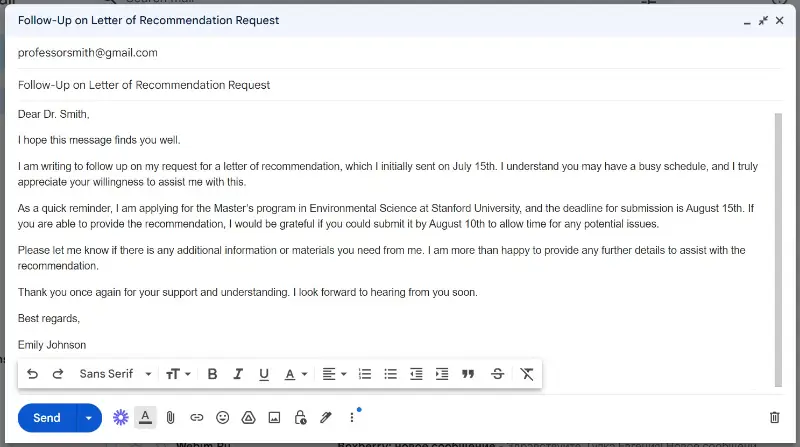When it comes to creating a standout resume, showcasing your achievements effectively is key. One often overlooked aspect is the inclusion of publications on your resume, which can set you apart in competitive industries.
Whether you're a researcher, writer, or professional with noteworthy contributions, properly adding your articles and studies demonstrates your expertise and commitment to your field.
In this article, we’ll explore how to add publications to your resume in a way that enhances its overall impact.
Create your professional Resume in 10 minutes for FREE
Build My Resume
When to include publications on a resume?
Publications are not always a necessary addition to your application, but they can be highly advantageous in specific situations.
Consider adding publications on resume if:
- Applying for academic or research roles. Publications are essential for positions in academia, as they demonstrate your expertise and contributions to your field.
- Pursuing writing or editorial careers. Articles, books, or other written works help showcase your skills and experience.
- Highlighting specialized knowledge. In industries like technology, healthcare, or finance, publishing white papers or industry reports can show authority and thought leadership.
- Relevant to the role. If the position directly aligns with your publication’s subject matter, it adds immediate value to your profile.
Avoid listing publications on a resume if:
- They are outdated or irrelevant to the job.
- You have too many to include in a concise format. In this case, provide a summary and link to a detailed list online.
- The content might distract from other critical skills or qualifications.
Types of publications on resume
1. Academic papers and journal articles
These are most relevant for academic, research, or science-related roles. Include peer-reviewed articles, particularly those published in respected journals.
Smith, J. (2023). Advances in Renewable Energy Storage. Journal of Green Energy, 12(4), 45-58.
Patel, R., & Lee, M. (2022). CRISPR Gene Editing: Ethical Implications and Future Prospects. Genetics Today, 9(2), 112-130.
2. Books or chapters
If you’ve authored or contributed to books, mention them, especially if they are influential in your field. Published books demonstrate deep knowledge and credibility.
Johnson, M. (2021). The Future of AI in Healthcare. New York: TechPress Publishers.
O’Connor, D. (2019). Climate Change and Policy Responses. Boston: Green Earth Publications.
3. Industry reports or white papers
These are crucial for roles where thought leadership or expertise is valued, such as consulting or executive positions. Highlight reports or papers tied to trends, analysis, or innovations in your industry.
Doe, J. (2023). The Digital Marketing Landscape: Trends for 2024. White Paper, Marketing Insights Group.
Ramirez, P. (2021). Global Supply Chain Disruptions and Recovery Strategies. White Paper, Logistics Leaders Council.
4. Blog posts and online articles
Include blog posts or articles if they are published on reputable platforms and are relevant to the role. While less formal, these can demonstrate your practical expertise.
“Top 10 SEO Strategies for 2024.” Published on MarketingWorld.com.
“Understanding Blockchain Beyond Bitcoin.” Published on TechTrends.org.
5. Conference papers or presentations
Academic or technical conferences often require paper submissions. If these were published in proceedings, they are excellent additions to your resume for roles emphasizing research and innovation.
Lee, A. (2022). Machine Learning in Climate Predictions. Proceedings of the International AI Conference.
Kaur, R. (2021). Enhancing Cybersecurity Protocols with AI. Proceedings of the International Cybersecurity Forum.
6. Co-authored works
If you co-authored a publication, include it but ensure your name is clearly highlighted. This shows teamwork and collaboration in producing valuable work.
Patel, R., Lee, M., & Johnson, T. (2022). CRISPR Gene Editing: Ethical Implications and Future Prospects. Genetics Today, 9(2), 112-130.
Garcia, L., Kim, S., & O’Connor, D. (2020). Chapter 4: Advances in Nanomaterials. In Materials Science Innovations (pp. 78-105). Academic Press.
Where to put publications on your resume?
The placement of publications in a resume depends on their importance and relevance to the job.
1. Dedicated “Publications” section
This way of how to list research publications on a resume is best for candidates with numerous or highly relevant publications.
Create a standalone section titled “Publications” or “Selected Publications.” Place it after your education or experience, depending on which holds more weight for the role.
Example layout:
Publications
- Smith, J. (2023). Advances in Renewable Energy Storage. Journal of Green Energy, 12(4), 45-58.
- Johnson, M. (2021). The Future of AI in Healthcare. New York: TechPress Publishers.
2. Within “Work Experience”
For publications directly tied to a specific role, include them as a bullet point under that entry.
Example:
Marketing Specialist
Albers Super Markets (2019–2023)
- Published “Digital Marketing Trends” in Marketing Today magazine (2022), reaching an audience of 10,000 professionals.
3. Under “Education”
Ideal for students or recent graduates without extensive professional experience. Include relevant papers, theses, or co-authored works.
Example:
- Master’s in Computer Science, New York University (2022)
- Published “AI Algorithms for Predictive Healthcare” in International Journal of AI Research.
4. Link to online portfolio or LinkedIn
If you have a significant number of articles, mention only the most relevant on your resume and provide a link to a complete list of publications.
View my full list of publications at www.johndoeportfolio.com/publications.
How to list publications on a resume?
1. Use a consistent citation style
Choose a standard format (e.g., APA, MLA, Chicago) that suits your field and use it consistently throughout the section.
Example (APA Style):
Doe, J. (2023). Advanced AI in Healthcare. International Journal of Medical Technology, 45(3), 123-135.
2. Prioritize relevance
List publications in order of importance or relevance to the job, rather than chronologically. Use headings like “Selected Publications” to indicate you’re showcasing only the most pertinent works.
3. Include essential details
Each entry should have:
- Author(s)
- Title of the work (italicized or in quotation marks)
- Where it was published (journal name, book title, website, etc.)
- Date of publication
- URL (if applicable)
4. Group similar publications
If you have multiple publications of the same type, group them for readability. For example, list all journal articles together, followed by industry reports.
Example:
Journal Articles
- Smith, J. (2023). Advances in Renewable Energy Storage. Journal of Green Energy, 12(4), 45-58. Conference Proceedings:
- Lee, A. (2022). Machine Learning in Climate Predictions. Proceedings of the International AI Conference.
Create your professional Resume in 10 minutes for FREE
Build My Resume
Publications on resume examples
Research position resume with publications
Johnathan Reed, PhD
Email: john.reed@email.com | Phone: (555) 555-5555 | LinkedIn: linkedin.com/in/johnreed | ResearchGate: researchgate.net/profile/JohnReed
Objective
Dynamic research scientist with expertise in molecular biology seeking to contribute to innovative cancer treatment projects at Memorial Sloan Kettering Cancer Center.
Education
PhD in Molecular Biology | University of Chicago | 2020
- Dissertation: "Epigenetic Regulation in Tumor Suppression Pathways"
BSc in Biochemistry | UCLA | 2015
Experience
Postdoctoral Research Fellow
National Cancer Institute, Bethesda, MD | 2020–2024
- Developed a novel assay to assess gene-editing efficiency, published in Nature Biotechnology.
- Secured $100,000 in grant funding for independent projects.
- Mentored graduate students on molecular biology techniques and data analysis.
- Conducted high-throughput sequencing experiments to identify oncogenic mutations.
Research Assistant
University of Chicago | 2016–2020
- Co-authored four peer-reviewed papers on protein-DNA interactions.
- Designed and optimized lab protocols, improving experiment reproducibility by 20%.
- Presented findings at the American Association for Cancer Research (AACR) Annual Meeting.
- Collaborated with a multidisciplinary team to investigate epigenetic changes in cancer.
Skills
- CRISPR technology, RNA-seq analysis, advanced microscopy
- Grant writing and research proposal development
Publications
- Reed, J., et al. "CRISPR-induced mutations in tumor suppressor genes." Nature Biotechnology, 2023.
- Reed, J., et al. "Epigenetic markers for breast cancer prognosis." Cell Reports, 2021.
- Reed, J., et al. "Gene silencing pathways in human cells." Journal of Molecular Biology, 2020.
Awards
- AACR Young Investigator Award (2022)
- NIH Postdoctoral Fellowship Grant (2021)
Healthcare publications section in resume
Maria Gonzalez, RN, MSN
Email: maria.gonzalez@email.com | Phone: (555) 444-3333 | LinkedIn: linkedin.com/in/mariagonzalez
Objective
Compassionate and detail-oriented nurse educator with a strong clinical research background, seeking a leadership role at Mount Sinai Health System to improve patient care outcomes.
Education
Master of Science in Nursing (MSN) | New York University | 2019
- Capstone Project: "Implementing Evidence-Based Practices in Stroke Rehabilitation"
Bachelor of Science in Nursing (BSN) | University of Texas | 2016
Experience
Clinical Nurse Specialist
Mount Sinai Hospital, New York, NY | 2019–Present
- Lead a team to design patient care protocols based on research findings, reducing readmission rates by 15%.
- Conduct workshops for 50+ nurses on evidence-based practices and patient care.
- Publish clinical findings in top-tier nursing journals and presented at conferences.
- Coordinate interdisciplinary meetings to improve care for post-stroke patients.
Staff Nurse
Texas Medical Center, Houston, TX | 2016–2019
- Delivered compassionate care to over 1,000 post-operative patients annually.
- Authored patient education materials for diabetes management and heart health.
- Participated in quality improvement initiatives that reduced patient falls by 25%.
- Trained new nurses on post-surgical care protocols and EHR documentation.
Skills
- Clinical data analysis, electronic health record systems, patient education
Publications
- Gonzalez, M., et al. "Optimizing post-stroke recovery through early intervention." Journal of Nursing Care Quality, 2024.
- Gonzalez, M., et al. "Evidence-based strategies for diabetes education." The American Journal of Nursing, 2021.
Certifications
- Certified Diabetes Educator (CDE)
- Advanced Cardiovascular Life Support (ACLS)
Adding publications to resume for a writer
Olivia Mitchell
Email: olivia.mitchell@email.com | Phone: (555) 222-1111 | Website: www.oliviamitchellwrites.com | Twitter: @omwrites
Objective
Creative and analytical writer with a proven track record in crafting compelling narratives and journalistic articles. Seeking to join The New York Times as a content strategist.
Education
- MA in Creative Writing | Columbia University | 2018
- BA in English Literature | University of Virginia | 2015
Experience
Freelance Writer
2018–Present
- Published over 100 articles for outlets including The Atlantic, The New Yorker, and The Huffington Post.
- Develop long-form investigative pieces that attracted over 500,000 readers collectively.
- Partner with editors to create SEO-driven content for high-traffic websites.
- Conduct interviews with industry leaders for feature-length articles.
Content Editor
BlueSky Media | 2015–2018
- Edited web and print copy for lifestyle and tech brands, ensuring audience engagement and SEO optimization.
- Supervised a team of three junior writers, providing feedback and mentorship.
- Created style guides to streamline content production and maintain brand consistency.
- Managed editorial calendars, ensuring timely delivery of all assignments.
Skills
- Story development, copyediting, SEO writing, and AP Style
Publications
- Mitchell, O. "The Rise of AI in Modern Literature." The Atlantic, 2023.
- Mitchell, O. "A Writer's Guide to Surviving Freelance Burnout." Writer’s Digest, 2021.
- Mitchell, O. "Rediscovering Gothic Novels in a Digital Age." The New Yorker, 2020.
Awards
- Pushcart Prize Nominee (2022)
- Best Emerging Writer, National Writing Awards (2020)
Conclusion
Knowing how to list your publications on a resume can elevate your professional profile, providing potential employers or collaborators with a glimpse into your knowledge and expertise.
By tailoring how you present these works to fit the job or opportunity at hand, you demonstrate both attention to detail and a strong sense of professional branding.
With the tips in this guide, you’ll be better equipped to showcase your accomplishments and leave a lasting impression.
Create your professional Resume in 10 minutes for FREE
Build My Resume












